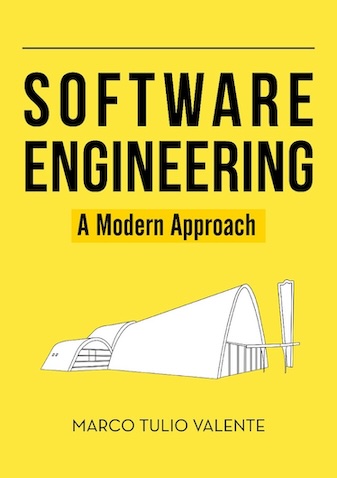This textbook is designed for undergraduate software engineering courses. Additionally, it can be used by junior developers looking to consolidate their knowledge in the field. The book has 350 pages, 10 chapters, and includes 120 exercises. A Portuguese edition is also available here.
New: Slides from a lecture on the impacts of AI in SE
E-book
Buy on Leanpub (pdf and epub)
Web Version
Chapter 1: Introduction
Historical Context, Topics of Study
Chapter 2: Processes
Agile Manifesto, XP, Scrum, Kanban
Chapter 3: Requirements
User Stories, Use Cases, MVP, A/B Testing
Chapter 4: Models
Class, Package, Sequence, Activity Diagrams
Chapter 5: Design Principles
Conceptual Integrity, Information Hiding, Cohesion, Coupling, SOLID
Chapter 6: Design Patterns
Factory, Singleton, Proxy, Adapter, Facade, Decorator, Strategy, Observer, Template Method, Visitor
Chapter 7: Architecture
MVC, Microservices, Message-Oriented, Pub/Sub
Chapter 8: Testing
Unit Tests, Principles and Smells, Coverage, Testability, Mocks, TDD, Integration Tests, E2E Tests
Chapter 9: Refactoring
Examples, Refactoring Practice, Automated Refactorings, Code Smells
Chapter 10: DevOps
Version Control, Continuous Integration, Continuous Deployment
Appendix: Git
License: Version for personal use only. Redistribution or modifications are prohibited.
Podcast
AI-generated podcast featuring chapter summaries for a quick review of the book’s content. Listen on Spotify, Apple Podcasts, Pocket Casts, or subscribe to the podcast feed.
Resources
- More than 900 slides, organized by chapter and updated regularly with examples and exercises: 1, 2, 3, 4, 5, 6, 7, 8, 9, 10, Ap
- True or False exercises (by chapter): 1, 2, 3, 4, 5, 6, 7, 8, 9, 10
- Code examples available on GitHub
- Hands-on exercises: Microservices, CI Servers
Instructors
If you're an instructor, use this form to request the exercise answers and links to the slides in Google Slides.
Supplementary Articles
These articles complement the book's content:
- Chapter 2: Agile Teams, Shape Up
- Chapter 3: MVPs, Product Discovery, Design Thinking, Jobs to Be Done
- Chapter 5: Domain-Driven Design, Deep Modules, Other Design Principles
- Chapter 6: Composite Design Pattern, Dependency Injection
- Chapter 7: Clean Architecture, Hexagonal Architecture, Serverless, Sagas
- Chapter 8: Mutation Testing, Examples of Tests
- Chapter 10: Branching Strategies, Code Review
Slide decks: deck 1 (ch. 2-3); deck 2 (ch. 5-6); deck 3 (ch. 7); deck 4 (ch. 8-10)
Universities Using Our Book
Our book is currently used by universities in over 25 countries worldwide. Selected institutions include:
- Africa: Alexandria University (Egypt), Ebenezer Higher Institute for Science and Technology (Cameroon).
- Asia: Thai Binh Duong University (Vietnam), FMV Isik University (Turkey), University of Sri Jayewardenepura (Sri Lanka), IIT Gandhinagar (India).
- Europe: University College Dublin (Ireland), University College Cork (Ireland), University of the West of Scotland (Scotland), Utrecht University (Netherlands), Zurich University of Applied Sciences (Switzerland), University of Fribourg (Switzerland), University of the Faroe Islands (Faroe Islands), Justus Liebig University Giessen (Germany).
- North America: Loyola University Maryland (USA), North Carolina State University (USA), Utah Valley University (USA), University of Fredericton (Canada).
- South America: Universidad Nacional de San Agustin de Arequipa (Peru).
🌎 Are you an instructor using the book? Please let us know by completing this form.
FAQ
1. Will an open version of the book remain available? Yes, the web version will remain freely available.
2. What is the difference between the web and e-book versions? The content is identical, but the e-book has more refined formatting.
3. Can I send the ebook to my Kindle? Yes, you can use Amazon's Send to Kindle service.
4. How can I support the project? The best way is to purchase the e-book.
Author
Marco Tulio Valente holds a Ph.D. in Computer Science from the Federal University of Minas Gerais, Brazil, where he is a Professor in the Department of Computer Science. Previously, he was an Adjunct Professor at PUC Minas for 11 years and a Systems Analyst at a telecommunications company for four years. He has authored more than 170 papers and supervised 35 master's theses and 16 doctoral dissertations.
Citing the Book
Please use the following reference:
Marco Tulio Valente. Software Engineering: A Modern Approach, Self-published, 2024. (bibtex)
Contact
To report errors or typos, use this form. All other feedback is also welcome.
